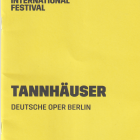Tannhäuser 2023Deutsche Oper, Berlin
Read more about the opera Tannhäuser
Up until the middle of the twentieth century, Tannhäuser was, by a very large margin, the most frequently performed of Wagner's operas in Britain. How times have changed. The last staged professional performance in Scotland was by Sadler's Wells Opera on tour as long ago as 1961. It has never previously featured in the programme of the Edinburgh International Festival or of Scottish Opera. This superb performance, even if only in concert form, was therefore extremely welcome.
Sir Donald Runnicles last conducted Wagner at the Edinburgh Festival fully twenty years ago, when he let us hear another rarity in Lohengrin. Since then he has done Tristan one act at a time in Glasgow, also in concert. Those events were all with his BBC Scottish Symphony Orchestra. More recently he has brought his musicians from Berlin, as is the case here. What must be said straight away is that this was a true company performance which from the first note of the overture showed the Deutsche Oper company to be absolutely on top form. In what has been a strong Festival musically this is likely to be one of those events that will stick in the mind for years. This lovely score with its vital role for the chorus came over as a blazing masterpiece, and the audience greeted it with entirely justified joy.
The chorus must be mentioned first. Whether as pilgrims or as delegates at the song contest their fullness of tone was wonderful. They were particularly impressive in the second act as they only made their entrance, in absolute silence, when summoned to the Hall of Song by the fanfare of six trumpets ranged along the back of the organ gallery. That scene was beautifully paced with what must be one of the most glorious choral parts in the entire operatic repertoire.
Several of these principals, including Clay Hilley and Emma Bell, appeared here last year in Fidelio. The title role is notoriously difficult to cast nowadays - perhaps one reason for the rarity of performance. Many tenors struggle with the part and are exhausted by the difficulties of the third act Rome Narration. Clay Hilley had no such problems. He was the one soloist who relied on a score, which suggests that he was trying out a new part for the first time. It seems to suit his voice beautifully, and he should now be able to add it to his repertoire of Wagnerian stage roles.
Emma Bell's voice seems to grow warmer and richer every time we hear her, and she was on majestic form, both in her opening Greeting and her valedictory Prayer. The American baritone Thomas Lehman has been a company stalwart for several seasons. He was a wonderfully mellifluous Wolfram, making an impression even in the competition solo, not just in his familiar hymn to the Evening Star. The Landgrave, Albert Pesendorfer, was a tall, distinguished-looking bass with a superb, dark velvety sound, ideal for the part.
Venus must be an ungrateful part to sing - an important role in the first act then a long gap until the final pages of the opera. Some singers have managed to fill the gap by singing Elisabeth as well, but here we had an ideal contrast in the American mezzo Irene Thomas. The Puerto Rican soprano Meechot Marrero made a superb contribution to the first scene as the Shepherd Boy, beautifully from a baxk corner of the choir stalls.
The one change from the line-up originally announced was the absence of last year's Don Pizarro - a sensible decision to give the far shorter role of Biterolf to another company member. Joachim Goltz fitted in well with the other Minnesingers - Attilio Glaser, Gideon Poppe and Tyler Zimmerman. Even in this concert performance they were able to project their different characters effectively, as if in a 'real staging.
A minor point was the edition to be used. The opera was launched at Dresden in 1845, and it is that version that has dominated performances in Scotland. However for the Paris premiere in 1861, much to the composer's disgust, a sequence of ballet music, the 'Bacchanale', had to be added, following immediately after the overture. We did hear some of this, including some off-stage chorus work. The important (and excellent) offstage banda was made up of guests from the RSNO, including several section principals.
A further point of interest is that this will be the first completely professional Scottish performance to be given in German - all the old companies - Carl Rosa, J W Turner, Moody-Manners, O'Mara and BNOC, as well as Sadler's Wells - used to perform in English. At least the Covent Garden company did not bring Tannhäuser to Scotland in Victorian times - they sang Lohengrin in Italian!
Al the above indication of the supreme quality of the performance could not have happened without the guiding hand of Edinburgh-born Sir Donald Runnicles. Long-established as one of the world's great conductors, not just of opera, he still finds time in his schedule to visit the Festival almost every year. For this we must all be extremely grateful. He has still not conducted any staged operas in Scotland, which does seem a shocking omission. Will it ever be possible money to be found to allow his wonderful Berlin company to be given a gig at the Festival Theatre?
Performance Cast
- Venus
- Tannhäuser a knight and minnesinger
- Shepherd boy
- Wolfram von Eschenbach a knight and minnesinger
- Hermann Landgrave of Thuringia
- Walther von der Vogelweide a knight and minnesinger
- Heinrich der Schreiber a knight and minnesinger
- Biterolf a knight and minnesinger
- Reinmar von Zweter a knight and minnesinger
- Elisabeth niece of the Landgrave

